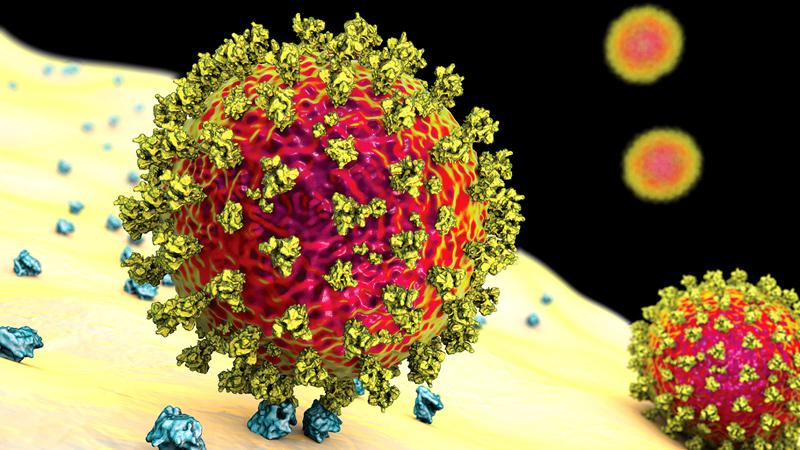
The variant, known in the UK as VOC-20DEC-01 (formerly VOC202012/01), includes multiple mutations in the spike protein, including N501Y. The spike protein is the part of the virus which first attaches to a human cell. These changes have resulted in the virus becoming about 50 percent more infectious and spreading more easily between people.
We know as evidence shows that the infection rates in geographical areas where this particular variant has been circulating have increased faster than expected despite control measures being in place, and the modeling of cases over time has demonstrated that this variant has a higher transmission rate than other variants in current circulation.
We do not know for certain the mechanism for this increase in transmission but it has been suggested that this variant is more effective at binding to angiotensin-converting enzyme 2, or ACE2 receptor, the protein that provides the entry point into the body for the corona virus.
Q: How long has this variant been in circulation?
A. Genetic evidence suggests this variant emerged in September 2020 and then circulated at very low levels in the population until mid-November last year.
The increase in cases linked to the new variant first came to light in December when PHE was investigating why infection rates in Kent were not falling despite national restrictions. We then discovered a cluster linked to this variant spreading rapidly into London and Essex. You can read our expert interview on finding this variant and the race to understand it here.
Q: What do we know about the variant first identified in South Africa?
A. The variant first identified in South Africa is called VOC-20DEC-02 (formerly VOC202012/02) and appears to have emerged around the same time as the variant originating in the UK. It has also been seen in a number of other countries. It shares the N501Y mutation to the spike protein but also has a number of other mutations including E484K.
Laboratory tests have shown that the E484K mutation may be able to escape the body’s antibodies and is therefore of potential public health concern, so it’s one we’re monitoring closely. All cases with this mutation are currently being followed-up closely and monitored in the UK.
The UK Government imposed a ban on direct flights from South Africa and restrictions on flights to the country in order to reduce the number of people infected with the variants entering the UK’s travel ‘red list is kept under constant review and is being enforced in an effort to stop the spread of variants.
Additional surge testing and sequencing is being deployed in a number of locations where the C
The Covid-19 variant first identified in South Africa has been found. Testing will, in combination with following the lockdown rules and remembering ‘Hands. Face. Space’ help to monitor and suppress the spread of the virus, while enabling a better understanding of the new variant.
Q: What about the variants emerging from Brazil?
A. Two variants of interest have also been identified in Brazil. The first variant is currently classified by PHE as a ‘variant under investigation’ VUI-21JAN-01 (formerly VUI202101/01) – this variant has a small number of mutations but does include E484K. The spread and significance of this variant remains under investigation and PHE will publish regular updates on the number of cases detected.
Q: What about the second variant originating from Brazil?
A. The second variant, VOC-21JAN-02 (formerly VOC202101/02), also referred to as P.1, was first detected in Manaus, a city in North West Brazil, as well as travellers from Brazil arriving in Japan.
This variant has been designated a ‘Variant of Concern’ because it shares some important mutations with the variant first identified in South Africa, such as E484K and N501Y.
It is possible that this variant may respond less well to current vaccines, but more work is needed to understand this. PHE is tracking all cases of this variant extremely closely and ensuring all contacts of individuals who test positive are extensively followed up through enhanced contact tracing. In some areas where cases have been identified, additional testing has also been introduced.
Q: Are these variants more dangerous?
A. UK investigators have calculated that being infected with the variant that was first identified in the UK is associated with an increased risk of hospitalisation and more severe disease compared to the earlier version of Covid-19 that was circulating. The absolute risk of death is still low.
As more cases of other variants are confirmed, we’re also monitoring them closely for any changes in severity, along with international partners.
The best way to protect against all variants is to get a test and practise hands, face, and space whenever you leave the home.
Q: If you have had the original strain can you catch a new one as well?
A. Our investigations are underway to find out more about these new variants. This includes whether immunity from a previous infection protects you against infection with a variant. We monitor reinfections (people who have two Covid-19 infections) in the community nationally, and through our large healthcare worker study SIREN, in partnership with the NHS.
Q: Do the current vaccines work against the variants?
A. It is very unusual for any variant virus to render a vaccine completely ineffective, however variants can alter the performance of vaccines to some degree. Studies are ongoing to assess this for multiple variants, but both laboratory and clinical studies are needed to be sure. The variants detected in South Africa and in Manaus, Brazil are the more concerning for potential effect on vaccines.
We are continuing efforts to understand the effect of the variants on vaccine efficacy. If required, future vaccines could be redesigned and tweaked to be a better match to these variants, as is the case for seasonal flu vaccines.
